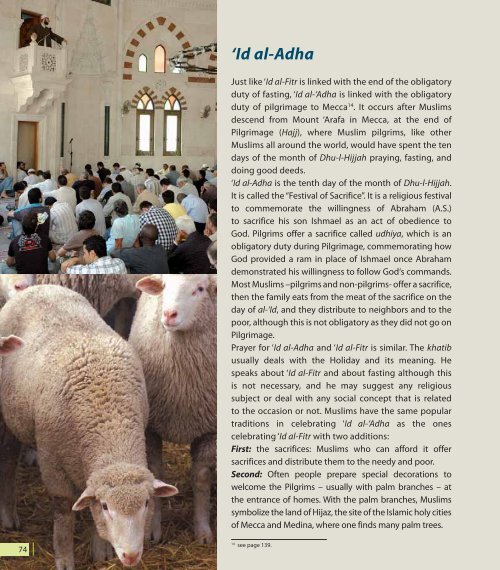Cultural aspects in Christian and Islamic religions - unesdoc - Unesco
Cultural aspects in Christian and Islamic religions - unesdoc - Unesco
Cultural aspects in Christian and Islamic religions - unesdoc - Unesco
You also want an ePaper? Increase the reach of your titles
YUMPU automatically turns print PDFs into web optimized ePapers that Google loves.
74<br />
‘Id al-Adha<br />
Just like ‘Id al-Fitr is l<strong>in</strong>ked with the end of the obligatory<br />
duty of fast<strong>in</strong>g, ‘Id al-‘Adha is l<strong>in</strong>ked with the obligatory<br />
duty of pilgrimage to Mecca 14 . It occurs after Muslims<br />
descend from Mount ‘Arafa <strong>in</strong> Mecca, at the end of<br />
Pilgrimage (Hajj), where Muslim pilgrims, like other<br />
Muslims all around the world, would have spent the ten<br />
days of the month of Dhu-l-Hijjah pray<strong>in</strong>g, fast<strong>in</strong>g, <strong>and</strong><br />
do<strong>in</strong>g good deeds.<br />
‘Id al-Adha is the tenth day of the month of Dhu-l-Hijjah.<br />
It is called the “Festival of Sacrifice”. It is a religious festival<br />
to commemorate the will<strong>in</strong>gness of Abraham (A.S.)<br />
to sacrifice his son Ishmael as an act of obedience to<br />
God. Pilgrims offer a sacrifice called udhiya, which is an<br />
obligatory duty dur<strong>in</strong>g Pilgrimage, commemorat<strong>in</strong>g how<br />
God provided a ram <strong>in</strong> place of Ishmael once Abraham<br />
demonstrated his will<strong>in</strong>gness to follow God‘s comm<strong>and</strong>s.<br />
Most Muslims –pilgrims <strong>and</strong> non-pilgrims- offer a sacrifice,<br />
then the family eats from the meat of the sacrifice on the<br />
day of al-‘Id, <strong>and</strong> they distribute to neighbors <strong>and</strong> to the<br />
poor, although this is not obligatory as they did not go on<br />
Pilgrimage.<br />
Prayer for ‘Id al-Adha <strong>and</strong> ‘Id al-Fitr is similar. The khatib<br />
usually deals with the Holiday <strong>and</strong> its mean<strong>in</strong>g. He<br />
speaks about ‘Id al-Fitr <strong>and</strong> about fast<strong>in</strong>g although this<br />
is not necessary, <strong>and</strong> he may suggest any religious<br />
subject or deal with any social concept that is related<br />
to the occasion or not. Muslims have the same popular<br />
traditions <strong>in</strong> celebrat<strong>in</strong>g ‘Id al-‘Adha as the ones<br />
celebrat<strong>in</strong>g ‘Id al-Fitr with two additions:<br />
First: the sacrifices: Muslims who can afford it offer<br />
sacrifices <strong>and</strong> distribute them to the needy <strong>and</strong> poor.<br />
Second: Often people prepare special decorations to<br />
welcome the Pilgrims – usually with palm branches – at<br />
the entrance of homes. With the palm branches, Muslims<br />
symbolize the l<strong>and</strong> of Hijaz, the site of the <strong>Islamic</strong> holy cities<br />
of Mecca <strong>and</strong> Med<strong>in</strong>a, where one f<strong>in</strong>ds many palm trees.<br />
14 see page 139.

















